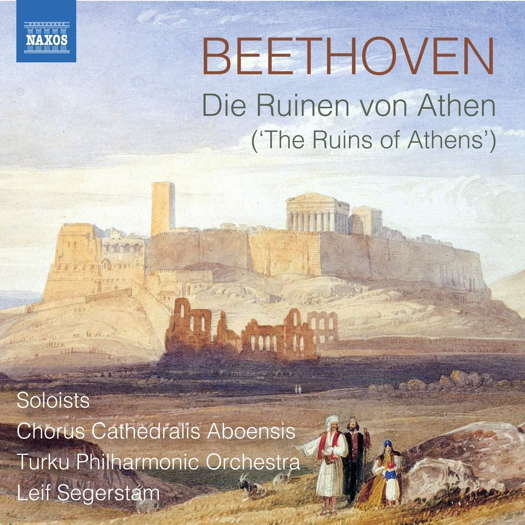- tango
- religion
- Strauss: Metamorphosen
- Regina Resnick
- William Faulkes
- Shakespeare: The Merchant of Venice
- Augusta Read Thomas: Plea for Peace
- Disney

Uniformly Excellent
A complete recording of
Beethoven's 'The Ruins of Athens',
highly recommended by JULIAN JACOBSON
'The maverick Finnish conductor and composer Leif Segerstam ... and his varied forces give a splendidly committed and characterful account of the complete entertainment.'
It is wonderful to have a complete recording of Beethoven's somewhat obscure music to August von Kotzebue's play of the same name. It was composed to celebrate the opening of the new German theatre in Pest in 1812. The only numbers likely to be familiar to Beethoven buffs today are the Turkish March, often heard in various transcriptions as well as the theme for Beethoven's splendidly zany Op 76 Variations, and the Chorus of Dervishes - the Overture is rarely played. These are surely unusual and characterful enough to whet one's appetite to hear the complete score.
Beethoven had an uneasy relationship with the theatre. His earnest, moral and political nature could not occupy itself with mere entertainment, much as he admired Rossini's 'Barber of Seville' (while expressing the view that Rossini should restrict himself to comic opera). He could never have set a libretto such as Così fan tutte. Of course the central work, perhaps in his entire output (though not necessarily the greatest), is the opera Fidelio, which cost him many years of labour, necessitating a complete revision and change of title from 'Leonore', and causing him much trouble with the censors. He was nevertheless always looking for suitable subjects and his other completed theatre scores include the ballet The Creatures of Prometheus and the Egmont music, for the 1787 play by Goethe.
The somewhat confusing plot of the Ruins of Athens concerns the return of Minerva, after a gap of two thousand years, to Athens which she finds in ruins. A chorus of dervishes serenades her, which she swiftly dismisses.
Listen — Beethoven: Chorus of Dervishes (The Ruins of Athens)
(track 10, 0:00-0:46) © 2019, 2020 Naxos Rights (Europe) Ltd :
a Turkish band of Janisseries makes a din which Beethoven conveys with the addition of piccolo and contrabassoon, and 'all possible noisy instruments such as castanets, cymbals etc' - Beethoven. Minerva bids Athens farewell but is informed of the 'new Athens' which will be Pest. In a splendid temple the chief priest welcomes the two muses Melpomene and Thalia, to be completed by the Emperor Franz II (Holy Roman Emperor).
This ripe farrago drew from Beethoven a kind of Singspiel with much spoken dialogue and some ten musical numbers. Little of the music is top-drawer Beethoven, but it certainly isn't negligible, some of it breathing the same air of elevated solemnity as the ceremonial music of The Magic Flute, alongside the more picturesque moments for Turks and dervishes. It's also easy to spot Beethoven's possibly subconscious self-borrowings, most obviously from the 5th Symphony. But it's a treat to have all the music, especially in such winningly performances as we get on this Naxos CD, the first recording to include all the spoken dialogue.
The maverick Finnish conductor and composer Leif Segerstam - 335 symphonies and counting - and his varied forces give a splendidly committed and characterful account of the complete entertainment. Right from the beginning Segerstam concentrates on a bright, even at times brash sonority, giving much prominence to the winds and keeping the textures lithe and airy, accentuated by the clean recorded sound without a hint of plushness. Reeta Haavisto (soprano) and Juha Kotilainen (bass) make a fine pair of soloists - the latter having to reach down to a bottom C in No 18: 'Will unser Genius noch einen Wunsch gewähren'.
Listen — Beethoven: If, moved by a people's pious requests (The Ruins of Athens)
(track 18, 3:02-4:01) © 2019, 2020 Naxos Rights (Europe) Ltd :
The recorded acoustic particularly favours the speakers and these too are uniformly excellent: their German is so clear that a moderately fluently, non-native speaker such as myself can immediately follow the dialogue - just as well, as no translations are provided, my one reservation on this recording.
Listen — Beethoven: Dialogue: Where are we now? (The Ruins of Athens)
(track 14, 0:00-0:22) © 2019, 2020 Naxos Rights (Europe) Ltd :
Despite this, in sum, an excellent addition to anyone's Beethoven collection, highly recommended.
Copyright © 10 April 2019
Julian Jacobson,
London UK

CD INFORMATION - BEETHOVEN: THE RUINS OF ATHENS
FURTHER INFORMATION - LUDWIG VAN BEETHOVEN




